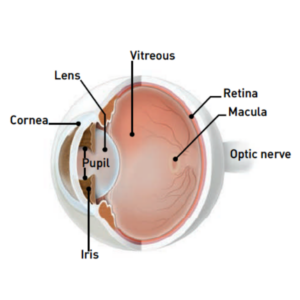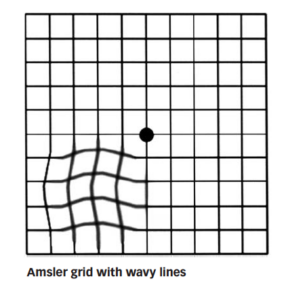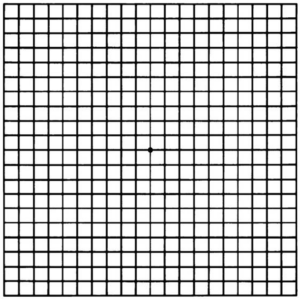- 541-884-3148
- info@klamatheyecenter.com
- 08:00AM to 5:00PM
Macular Degeneration
A Closer Look
What is Macular Degeneration?

Macular degeneration is a disease of the macula — a small area in the retina at the back of the eye. The macula allows you to see fine details clearly and do things such as read and drive. when the macula does not work properly, your central vision can be blurry and you may have areas that are dark or distorted. Macular degeneration affects your ability to see near and far, and can make some activities — like threading a needle or reading — difficult or impossible.
Macular degeneration is the most common cause of severe vision loss in people older than 50.
Although macular degeneration reduces vision in the central part of the retina, it usually does not affect the eye’s side (peripheral) vision. For example, you may be able to see the outline of a clock but not be able to tell what time it is. Macular degeneration alone usually does not cause total blindness. Even in more advanced cases, people usually continue to have some useful vision and are often able to take care of themselves. ln some cases, macular degeneration may not affect your vision very much. In other cases, however, vision loss may be more rapid and severe.
What causes Macular Degeneration?
Many older people develop macular degeneration as part of the body’s natural aging process. There are different kinds of macular problems, but the most common is age-related macular degeneration (AMD or ARMD).
Our bodies constantly react with the oxygen in our environment. Over time, as a result of this activity, our bodies produce molecules called free radicals. These free radicals affect our cells, sometimes damaging them. This is called oxidative stress, and is thought to play a major role in how AMD develops. Many people (approximately 1 in 3 Caucasians) have genetic changes that make them more prone to this damage.
Major risk factors for AMD are:
• Cigarette smoking;
• Genetic predisposition or having a family history of AMD;
• Being more than 50 years old.
Another risk factor for developing AMD may include having abnormal cholesterol levels.
Many people with AMD have deposits under the retina called drusen. Drusen alone usually do not cause vision loss, but when they grow in size or number, there is an increased risk of developing advanced AMD.
The two most common types of AMD are dry and wet.
DRY MACULAR DEGENERATION
Ninety percent of people with AMD have the “dry” form. This condition is caused by damage (oxidative stress) and results in thinning of macular tissue. vision loss is usually gradual. Many people with this form also have difficulty adjusting to changes in light. For example, they may find it takes them some time to adjust to seeing indoors when they come in from outside.
WET MACULAR DEGENERATION
Ten percent of people who have AMD have the “wet” form. Many of these people develop significant vision loss. Wet AMD results when abnormal blood vessels form underneath the retina. These new blood vessels leak fluid or blood and blur central vision. vision loss may be rapid and severe.
What are the symptoms of Macular Degeneration?

Macular degeneration can cause different symptoms in different people. Some people hardly notice AMD in its early stages. Sometimes only one eye loses vision while the other eye continues to see well for many years. But when both eyes are affected, you notice the loss of central vision quickly.
Usually, you will notice vision loss when you find:
• Words on a page look blurred;
• A dark or empty area appears in the center of vision;
• Straight lines look distorted, as in the diagram above.
How is Macular Degeneration diagnosed?
Many people do not realize that they have a macular problem until blurred vision becomes obvious. Your ophthalmologist (Eye M.D.) can detect early stages of AMD during a medical eye examination.
This exam includes:
• A simple vision test in which you look at a chart that looks like graph paper (called an Amsler grid);
• An exam of your macula with special lenses;
• Having special photographs taken of your eye with fluorescein angiography and optical coherence tomography (OCT). Fluorescein angiography uses photographs and a fluorescein dye to illuminate any abnormal blood vessels that may be under your retina. OCT scanning is a sophisticated and exact tool that detects abnormal blood vessels by creating a special picture of your macula.
How is Macular Degeneration treated?
Nutritional Supplements Antioxidant vitamins and zinc may reduce the impact of AMD in some people. A large scientific study found that people at risk for developing advanced stages of AMD lowered their risk by about 25 percent when treated with a high-dose combination of:
• Vitamin C (500 mg);
• Vitamin E (400 iu);
• Beta carotene (15 mg);
• Zinc (80 mg), and
• Copper (2 mg).
Another large study in women showed a benefit from taking folic acid and vitamins B6 and B12. And a large study evaluating the benefits of lutein and fish oil (omega-3) is ongoing.
Among those who either have no AMD or very early AMD, the supplements do not appear to be beneficial. Family members of patients with AMD should check with their doctor before taking these vitamins themselves.
It is very important to remember that vitamin supplements are not a cure for AMD, nor will they give you back vision that you may have already lost from the disease. In certain cases, there may be some risks with taking supplements. However, specific amounts of these supplements do play a key role in helping some people at high risk for advanced AMD to maintain their vision. Talk with your ophthalmologist to find out if you are at risk for developing advanced AMD, and to learn if supplements are recommended for you.
ANTI-VEGF treatments, laser surgery and PDT

The most common treatment for wet AMD involves injecting a drug into the eye that stops blood vessel growth and bleeding. These drugs, known as VEGF blockers or anti-VEGF treatments, target a specific chemical in your body that causes abnormal blood vessels to grow under the retina. That chemical is called vascular endothelial growth factor (VEGF). These anti-VEGF treatments improve vision in some people with wet AMD.
Certain types of wet macular degeneration can be treated with laser surgery, which is a brief, outpatient procedure that uses a focused beam of light to slow or stop leaking blood vessels that damage the macula.
A treatment called photodynamic therapy (PDT) uses a combination of a special drug and laser treatment to slow or stop leaking blood vessels.
These procedures may save more of your sight overall, though they are not cures that bring your vision back to normal. Even with advanced medical treatment, many people with macular degeneration still experience vision loss.
Making the most of the vision you have
To help you use the vision you do have, your Eye M.D. can prescribe low-vision equipment to help with everyday tasks or refer you to a low-vision specialist or center. There are many support services and rehabilitation programs to help people with AMD stay active and independent. Because your side vision is usually not affected, your remaining sight is very useful. Often, you can continue with many of your favorite activities by using low-vision equipment, such as a variety of magnifiers, portable electronic aids, special television equipment, large-print reading materials and talking or computerized items.
TESTING YOUR VISION WITH THE AMSLER GRID
You should check your vision daily by using an Amsler grid like this on this page. Y your vision that you wouldn’t notice otherwise. Putting the grid on the front of your refrigerator is a good way to remember to look at it each day.
To use the grid:

1. Wear your reading glasses and hold this grid 12 to 15 inches away from your face in good light.
2. Cover one eye.
3. Look directly at the center dot with the uncovered eye.
4. While looking directly at the center dot, note whether all lines of the grid are straight or if any areas are distorted, blurred or dark.
5. Repeat this procedure with the other eye.
6. If any new area of the grid looks wavy, blurred or dark, call your ophthalmologist promptly.
